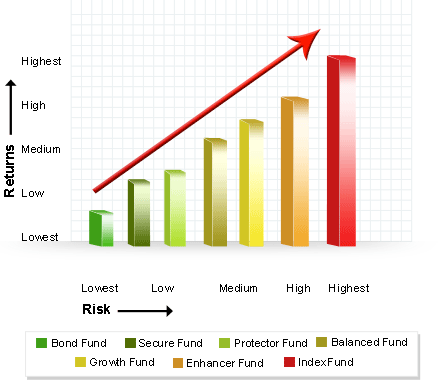Risk Apetite
Risk appetite is the ability to take certain risks in order to make gains. Each individual has a unique risk appetite when it comes to investing money.
Factors affecting a person's risk appetite:
The risk appetite of an individual depends on various factors like
- Age
- Life stage
- Number of dependents
- Nature of job / business
- Financial responsibilities etc.
- For instance a person nearing his retirement may have a lower risk appetite than a young person, though both of them may have a similar job profile and may draw a similar salary.
Before investing, it is advisable to determine your risk profile and then opt for a suitable fund.
Risk Profile of Funds:
As a thumb rule the fund with maximum exposure to equities is the most risky of the funds while the fund with maximum exposure to money market securities is the least risky. Similarly as risk and return go hand in hand, equities have the potential to provide the best returns among various asset classes while money market instruments give the lower returns but with negligible risk. Also, among equity funds large-cap funds are less risky than mid-cap funds.
Fund Investments:
An investor may choose to alter his fund investments, depending on whether his risk profile has undergone a significant change or market conditions have altered.
Many a times, an investor with high risk appetite may opt for low risk funds if he perceives that the market conditions are not suitable for investing in equities. In such a case, he may shift from a low risk fund to a high risk fund at a later stage, when he is convinced about the performance of the equity markets.
Investing in Aviva's funds:
We offer a wide spectrum of funds with different asset allocations, to meet different risk-return needs of investors. The matrix below may be used as a guide while choosing the right investment option as per one's risk profile and return expectation.
Risk Return Matrix



